- Home
- J. -H. Rosny aîné
Helgvor of the Blue River Page 6
Helgvor of the Blue River Read online
Page 6
The tiger leaped aside, and the bear sought to clutch him again. They were face to face, red with the blood of ten wounds, each now fully aware of the power of his opponent. Perhaps there was some hesitation. But pain, hatred, the lust for revenge, shot their quivering bulks to the fight.
The tiger fell, the bear sank his fangs in the depth of the flesh, but one of his paws became useless, crushed. The huge chests creaked with the effort. The tiger groped for another paw. But the jaws of the bear slashed into his enemy’s throat, wrenched at it, pierced it, dug into it.
When the feline succumbed, the bear rose, staggering, uttered a grunt of pain, then, weakened by loss of blood, dropped back to the ground. Then a dim joy stirred the jackals, the wolves and the hyenas, and from everywhere frailer beasts who had witnessed the combat emerged from the grasses, the bushes, the forest.
It was a subtle swarming of pupils, of paws, of muzzles, the secret life, the unquenchable life, and already the devouring tiger, whose scent alone caused the multitude to flee, was sniffed by voracious nostrils, felt by small teeth.
Helgvor had indistinctly seen, through the brush and the tall ferns, the coming of hyenas, wolves and jackals, then the fierce battle. The wind brought together the sweet odors of the vegetation and the stench of the animals. He heard the gray bear growling, the tiger roar. Then came a prolonged silence, broken by pants, weak cries and muffled moans.
Which had won? Or had they both been wounded, and given up the struggle? He thought that one or the other might remain near the enclosure, and then danger would be feared, night or day. His tribe at times hunted the huge cats. Helgvor, with arrows, hatchet and club, had killed a lion. But he had been badly wounded himself and had remained unconscious for hours. Had he been alone, the prowling beasts would have devoured him.
As he remembered that, he knew he was tired. He feared that he would not fight well due to fatigue. For a space the wolf growled, the dog smelled the air. Then they sank to the ground, and slept.
IX. To The Victor…
Helgvor was still asleep when day came. Squatted near the ashes of the fire, Hiolg was dozing. There was joy in the trees and upon the earth. The night seemed eternal each time, because death roamed and all the weak feared they might fill the bellies of the strong. But when darkness was vanquished, hope was boundless as the birds sang, facing the rising Sun. Hiolg touched Helgvor gently, and the warrior rose instantly. Like a wild animal, he was always on the alert, and rose club in hand.
“The eyes of Hiolg no longer see, his ears no longer hear!” the child said. “Hiolg can sleep,” the man said.
The Sun shed an amber light through the branches of the trees, dispelling the mists of the morning. Only the bones of the Tzohs were left, and the tiger was a skeleton also. The bear, still alive, kept the greedy jaws at bay.
Helgvor inhaled the fresh air, the creating air, and his youth swelled in a flooding of happiness, his victory filled him with limitless strength. Turning his eyes toward the two women and the child, he believed Amhao dead until he saw her chest rise and fall perceptibly. Glava, weak from bleeding, slumbered.
The wolf and the dog, awakened by hunger, turned trusting eyes toward their master. They were granted their share of the dry meat. Then, stirring up the fire, the Ougmar cooked his meal. The mysterious force of the food increased his joy of living, his tenderness; these women, these children, even the wolf and the dog, saved by his courage and his muscles, seemed part of his own being.
When the Sun had dissipated the fog, Helgvor left the enclosure and found the skeletons of the Tzohs, near the fleshless bones of the tiger. As the warrior drew near, the gray bear lifted his head, which was swarming with insects, and a veil appeared to screen his pupils. His gaping wounds festered, his death was certain. As Helgvor halted to stare at him, a painful snarl of menace lifted the hairy lips.
“The great bear shall not hunt any more!” the nomad said. “Long has he caused the horse, the stag, even the aurochs, to tremble. He has killed the tiger. The great bear is almost as mighty as the mammoth—and the great bear is about to die!”
The erect beasts loved to utter words to fit circumstances, and the Ougmar loved speech.
“The great bear is about to die,” the hunter repeated. “He will be torn to pieces by the jackal, the wolf and the hyena. But his flesh is good for man also, and the Ougmar has not enough to feed his women and children. The great bear must give of his flesh.”
A doe raced by, within arrow range. Helgvor felt that it was better to allow her to pass, for she was fitted to reproduce life. The doomed beast would supply meat without waste of life. He picked up his spear, selected a spot through which to reach the heart. The blade sank in, moved about. The bear uttered a groan of agony, but his weakness was so great, so like death, that he scarcely quivered.
“The great bear would have suffered until night,” resumed the son of Shtra, “and perhaps the wolf and the hyena would have devoured him alive.”
He picked up the scattered arrows, a few tools left by the Tzohs, spears, three bronze hatchets, then went back to the bear; he cut off both hams and some slices of tender meat. The pelt was very handsome. He would skin the animal later, if he had time. Thirst was searing his mouth, and he searched for water. Eventually he found a source and he drank deeply.
Going back to the enclosure, he found all quiet. The dog and the wolf were again asleep, but Glava was awakening. The flow of blood had stopped, her wounds were not deep, and she was moaning, bending over Amhao.
“Amhao shall not die!” the nomad assured her.
Glava understood his gestures, and a smile spread on her bloodstained face. Then, seeing her arms blackened and reddened, she desired to wash them. He guessed that she must be thirsty as well, and pointed to the forest.
“Helgvor found a spring.”
There were three waterskins, roughly made. One belonged to Helgvor, the others he had found on the Tzohs. The warrior indicated that he was going to fill them, and Glava wished to go with him. But her legs still quivered under her weight.
“Helgvor shall go with Hiolg.”
He also took the animals along.
When Glava had drunk, she hid behind a boulder to wash her body. Meanwhile, Helgvor cooked some meat for her, and as she ate, he found pleasure in watching that light-colored face in which gleamed eyes the hue of the river.
Why doesn’t she resemble the Tzohs? he wondered.
Glancing at Amhao, he compared the cubical head, the wide face, the heavy jaws of the elder with the delicate features of the girl. Their complexions differed oddly, too. That of Amhao was the color of oak bark, with coppery glints; that of Glava almost white, like the petals of a flower. Amhao’s torso was bulky as that of a sow, Glava’s flexible like that of a doe. Glava was tall and lithe.
Amhao is a daughter of the Rocks. But Glava is like the daughters of the Green Lakes and the Blue River.
Proud to have saved her, he admired her because she had fought with the courage and skill of a warrior. Amhao awoke when her child cried. Although dazed and dull, she recognized her sister.
“Amhao is saved,” Glava informed her. “The tall warrior of the River has killed off those who attacked us!”
The young woman listened vaguely. She could neither see nor hear clearly. She repeated: “Amhao is saved.”
She drank water greedily, but could eat nothing. She fell asleep as Glava washed her face.
Helgvor thought as a warrior thinks: of the danger, of the human foes, of animals. He did not plan to pick up the trail of the Tzohs, for he counted upon Glava to guide the Ougmars to their homes. But what had become of the sixth enemy, of which the wolf and the dog found no trace?
He could not go away by canoe. Often the river was too rapid for the strength of several men; in a large craft, a single paddler would be helpless. Would the man join his clan on foot? The road was long, particularly for a wounded man. The Ougmar called the child.
“Hear me, Hiolg: Helgvor and th
e dog, Hiolg and the wolf, will seek the tracks of the wounded Man of the Rocks. Helgvor will not go far, for he must watch the enclosure. Hiolg must not fight. When he has seen the Tzoh, he comes back.”
“The Man of the Rocks is wounded,” the boy replied. “Perhaps the wolf can finish him.”
“Hiolg shall not fight!” Helgvor ordered. “Hiolg shall remain unseen. And he shall return here when the Sun starts to set.”
No warrior could conceal himself better than the boy in ferns and grass, in rocks or bushes.
“Hiolg will hide like a fox!” he stated.
They searched for tracks. Helgvor returned to the enclosure often, while Hiolg carried on into the forest. His memory for sites and trails was extraordinary, his mind retained the image of every step taken. Many heavy beasts had walked about, the tracks of the Tzoh could not be picked up. Hiolg walked toward the marsh and the river, but scouted to one side or the other often. The wolf helped him, but, being less docile when with the child than with the man, he roamed more or less as he liked.
The child and the animal found the tracks almost at the same time. It was on moist soil in which the man’s feet had left deep imprints. Because there were many, perhaps also because he deemed his lead too great for pursuit, the Tzoh had made no effort to conceal them.
Hiolg allowed the wolf to scent them a long while, then resumed the hunt, increasing his wariness, dilating his sharp pupils. A great pride distended his puny chest, for the soul of a warrior welled within him.
At length he espied the man. Stretched on the ground, weakened, tired and fierce, feverish from his wound, the warrior thought gloomily of the defeat inflicted on Kamr and his companions. Lurking in the darkness, he had witnessed the struggle, and when all the Tzohs had fallen, he had gone into the forest. He had not slept much, constantly awakened by inner tremors of fear, gripped by panic, his right hand useless. Despite his bronze hatchet, he had become a weak animal.
This morning his head was not clear and he heard humming in his ears the threat of secret dangers; it was a bad omen, which often announced the death of wounded warriors. The hum increased as the Sun rose higher. Tzoum, son of the Stag, had applied grass to the wound, but the compress did not ease his pain: the hole was black and burning; he felt the pulse beat in the raw flesh.
Prone at the foot of a sycamore-tree, he felt the terror of being alone, far from friends, far from home caves. The defeat of Kamr depressed him as much as the wound; his race had proved the weaker, and that weakness he felt in his bowels.
“The Tzohs are mightiest,” he muttered, to give himself cheer, and because he had a strong love for his breed.
Hidden in the bushes, Hiolg trembled as he identified him.
The wounded warrior was the very man who had captured the boy’s mother and slain his grandfather. Because he was young, Hiolg was forgetting, he had consoled himself already, but the sight of the Tzoh made his memory flare up blindingly, and aroused the child to fury.
“The Tzoh has no spear,” he mused. “His hand is sick. Hiolg and the wolf are stronger.”
The warrior, a man of thick torso, short of legs, long of arms, had an enormous face and thick hair which fell down over his sloping forehead almost to the eyes, which, like those of the bison, were set high up toward the temples. His strength must be that of the great boar. The child held the wolf and said ardently,
“Hiolg must not fight. But the Tzoh took away Hiolg’s mother.”
The wolf sniffed the warrior’s scent, stronger because of the man’s illness. He recalled the Tzoh he had strangled on the preceding evening. Suddenly he broke free, and slid to the tree under which the warrior lay. His walk was as silent as the flight of a night bird, but he frightened a rabbit, which fled madly.
The Tzoh turned, saw the wolf, and rose proudly, hatchet in his left hand. “Tzoum has slain ten wolves. A wolf is no stronger than a deer before a Tzoh’s hatchet. Tzoum laughs at the wolf!”
The eyes of the wolf glowered; those of Tzoum glittered with fever, and the man lied: he was afraid. He was afraid because he was on alien soil, because the unknown voices whistled shrilly in his ears, because Kamr had died despite his strength, and because the wolf’s ways were not those of wild wolves.
“Tzoum shall offer a sacrifice to the Hidden Lives!” Tzoum promised.
The wolf circled the man. His neck was powerful, his teeth fine and pointed: he showed them, parting his jaws in a snarl of threat and defiance. Tzoum whirled the hatchet about his head. It was of the finest bronze, very sharp.
“Tzoum has slain larger wolves than the black wolf.”
Backed against the tree, he did not see Hiolg, creeping near like a snake. The wolf scented the man’s weakness, and seeing Hiolg coming, he did not move, held his ground, eyeing the warrior sideways. The son of the Stag, sure that he had frightened the beast, cried out louder,
“With a single stroke, Tzoum can cleave the skull of the wolf.”
A sharp sting in his thigh made him quiver, his knee gave beneath his weight. Hiolg’s spear had struck him. Startled, the warrior turned, and while he turned, with a single leap, the wolf was at his throat. Then the child drew out the spear, struck again. The big man crumpled like an uprooted tree, while the beast clung, strangling him. In a flash, Tzoum saw the caves, the warriors, the women, then he slipped into the shadows. The wolf lapped his hot blood.
Hiolg, recalling the words and gestures of warriors, clamored stridently, “Hiolg and the black wolf have slain the big warrior. Hiolg and the wolf are the stronger!”
When he reached the enclosure, with the bronze hatchet and the fur garment of the Tzoh, the child said, “Hiolg did not wish to fight. But he could not hold back the wolf. And the Tzoh had taken the mother of Hiolg. Hiolg stabbed his thigh twice, and the wolf strangled the warrior.”
“That is well,” Helgvor said, his hand on the little fellow’s head.
“Hiolg shall be a warrior, and even a chief, when the time comes.”
Boundless happiness flooded Hiolg.
At the end of two days, Glava’s wounds were healing. The blood had ceased flowing, the flesh was dry and the ache was scarcely noticeable, save during the night, and the girl could walk easily. Amhao healed more slowly. Nevertheless, rich in youth, her life was resuming. Habit had already united the man and the two women. They admired his strength, his size and his courage.
According to ancestral instinct, Amhao was willing to obey the orders of Helgvor, who now seemed her master. Glava differed from her as a she-wolf differs from a doe: a will for freedom flamed in her, the same urge that had taken her away from the caves, the same which had brought her into the solitude of the forest and caused her to fight like a male warrior.
Unimpressed, she was near Helgvor as an equal. He, by instinct and in gratitude for her courage, understood and accepted her pride. In any case, she intimidated him somewhat, and this unusual timidity thrilled him so that he did not wish to react against it.
They combined their skill and knowledge. Glava knew how to handle a needle and could weave cloth. Helgvor made stout weapons and delicate tools with stone, with horn, with bones. They now had many weapons: the spears, hatchets, bows and arrows of the Tzohs had been collected, and Helgvor honed the edges and points.
The words and gestures they exchanged so often became less obscure. Glava was learning Ougmar. Her memories, formerly forgotten, welled to the surface of her mind. The words spoken by her grandmother made other words easy to understand. Helgvor made little effort to speak Tzoh, for he hated the language of his foes.
He learned that Amhao had been fated for sacrifice when Glava had forced her to flee. He now also knew that the Tzohs lived upstream, more than two moons’ march from the Ougmar camp. Since her mother’s death, Glava had only bad memories, save those of Amhao; she hated the Tzohs more than before the fight, aware that if the fugitives were recaptured, they would be put to death. Thus her fate was linked to that of the son of Shtra.
In the presence
of Glava, the nomad experienced unknown sensations. Growing more slowly than the Tzohs, the young Ougmars, until at an age decided by the old men, had no right to take a woman.
Glava knew more, for the Tzohs obeyed brutal and sensual instinct. But what she had seen filled her with horrified disgust. The chief, Urm, or another old man broke the canine teeth of the girl with a stone, indicating that the woman was thereby submitted without defense to the will of her mate. Then the warrior came forward and struck the woman over the head, and when their union had thus been announced, she became his slave.
She worked for her man and her children. He could beat her and even kill her without punishment. For the one who could have avenged her, usually the brother of the mother, had to accept blood price if offered.
These traditions horrified Glava. She feared as a day of torture the time when she would be given to Kzahm, the Black Boar, whose odor was fetid. She knew also how harshly Amhao had been treated. She feared that the usages of the Ougmars were similar.
In reality, they were not as rough. Canine teeth were not broken off. Those who wished to be engaged to a maid or a widow had to obtain the mother’s consent, or the permission of the mother’s brother or his successor.
Glava did not know these things. She liked to be with Helgvor, she admired his stature and even his face, but she could not imagine that this man of an alien breed could be her companion for life. And she wished for no closer tie than that which, vague yet tender, now linked them.
He did not think clearly. He trembled when her eyes, the mingling hues of the river and of dead leaves, rested on him. He quivered when the long hair, which she washed in the stream so often, touched his arm or his shoulder. He appreciated the teeth, as white and strong as those of a wolf cub, the supple stride, the round neck, but he did not think of the future. Perhaps he was thus calm because there was no other man about, and the madness which blinds stags, felines and birds could not be aroused.

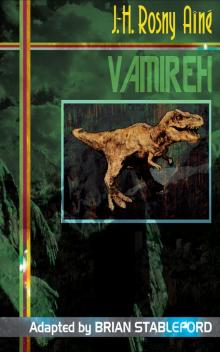 Vamireh
Vamireh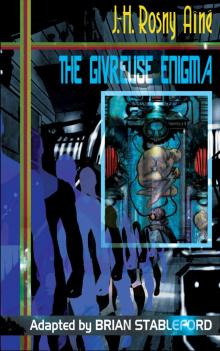 The Givreuse Enigma
The Givreuse Enigma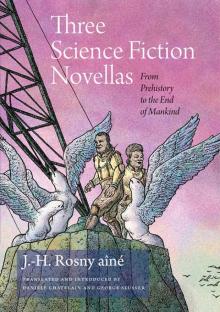 Three Science Fiction Novellas: From Prehistory to the End of Mankind
Three Science Fiction Novellas: From Prehistory to the End of Mankind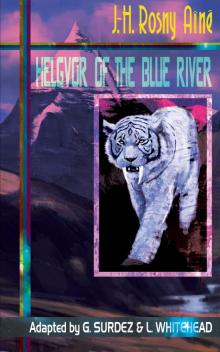 Helgvor of the Blue River
Helgvor of the Blue River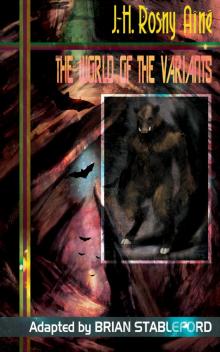 The World of the Variants
The World of the Variants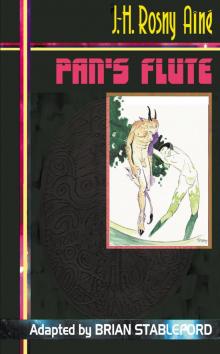 Pan's Flute
Pan's Flute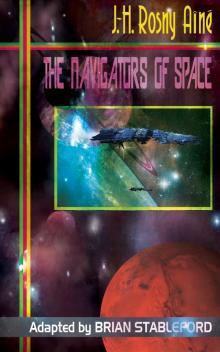 The Navigators of Space
The Navigators of Space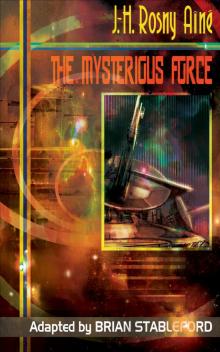 The Mysterious Force
The Mysterious Force